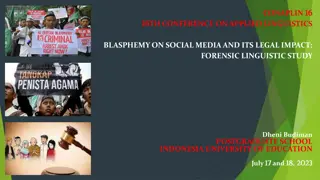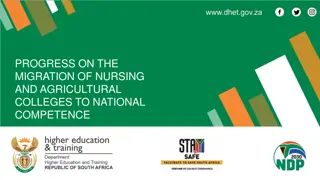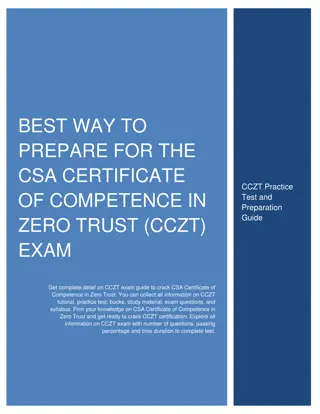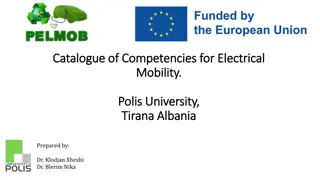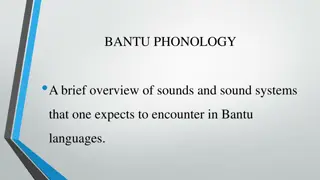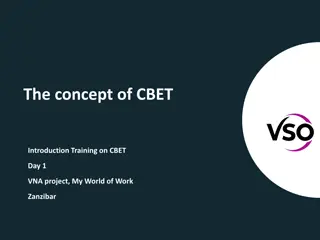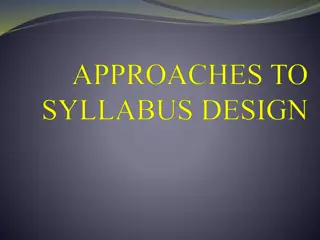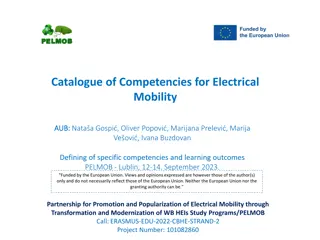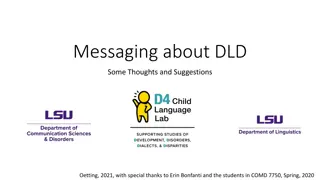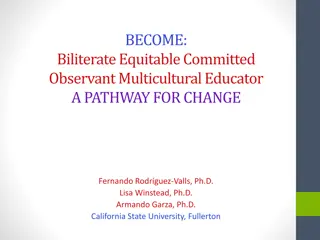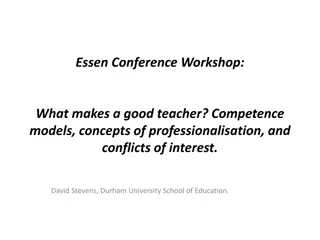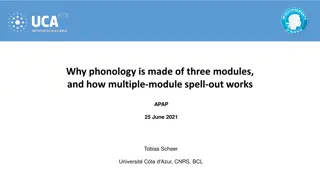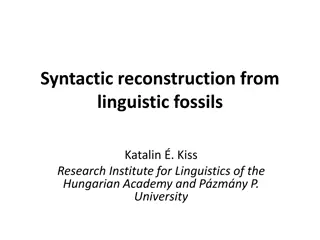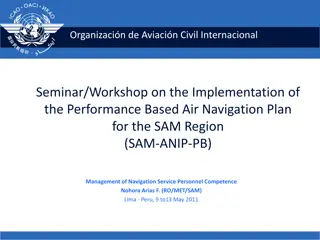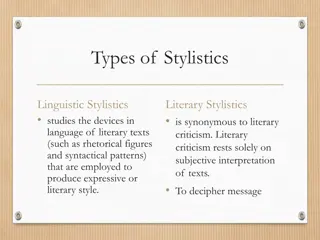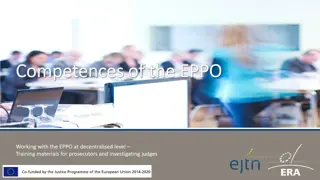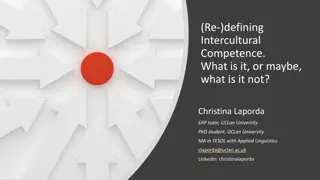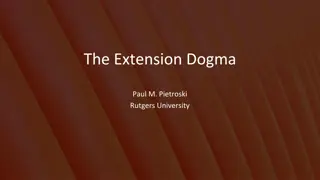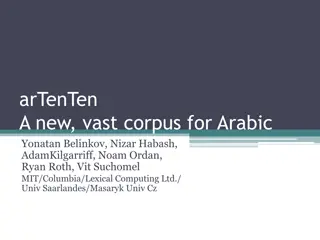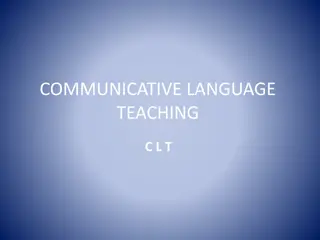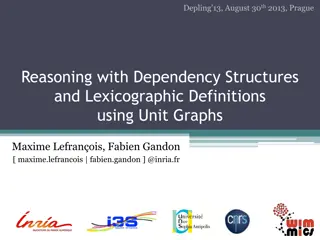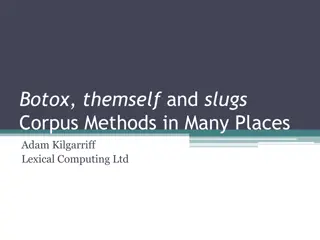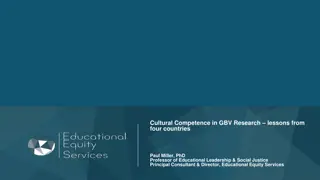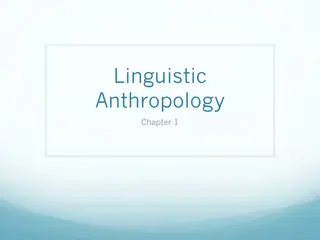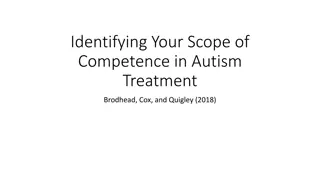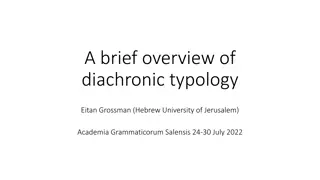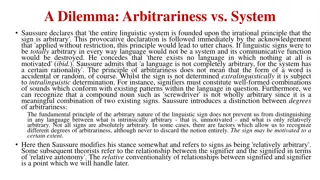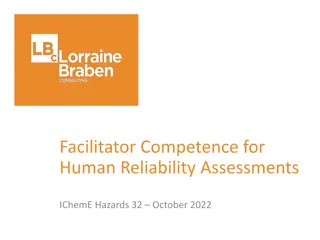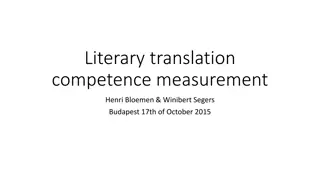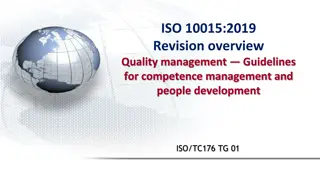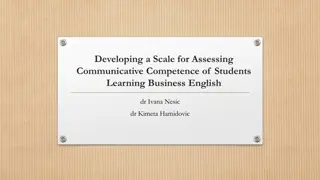Enhancing Competence and Patient Care Through CBD Coaching Model
The CBD Coaching Model, led by professionals like Dr. Denyse Richardson, focuses on facilitating the development of competence in residents to improve patient care. It emphasizes Competence by Design, workplace-based assessment, and coaching feedback to promote continuous learning and growth mindset
1 views • 31 slides
Impact of Blasphemy on Social Media: Forensic Linguistic Analysis
Language plays a crucial role in human communication, especially on social media platforms where public speech can have legal consequences. This research delves into the concept of blasphemy on social media and its legal implications, focusing on linguistic forensic study. It explores how language c
7 views • 24 slides
Progress on Migration of Nursing and Agricultural Colleges to National Competence
The progress report discusses the migration of nursing and agricultural colleges to national competence, highlighting updates on governance, administration, and incorporation into higher education. It outlines the background, purpose, status, and presentation outline of this migration process, empha
2 views • 27 slides
Transforming Medical Education: Competence by Design and CanMEDS Framework
Competence by Design (CBD) is a multi-year initiative revolutionizing medical education through competency-based models like CanMEDS 2015. This presentation explores the integration of milestones, EPAs, and the Competence Continuum in CBD implementation, emphasizing specialty-specific training stage
2 views • 19 slides
CSA Certificate of Competence in Zero Trust (CCZT) Exam | Best Way to Prepare
Click Here--- \/\/bit.ly\/3yHlb3O ---Get complete detail on CCZT exam guide to crack CSA Certificate of Competence in Zero Trust. You can collect all information on CCZT tutorial, practice test, books, study material, exam questions, and syllabus. Firm your knowledge on CSA Certificate of Competence
0 views • 8 slides
Competencies for Electrical Mobility at Polis University, Tirana, Albania
This catalogue outlines the competencies required for electrical mobility, focusing on three key areas: Intrapersonal competence, Engineering competence, and Interpersonal competence. It emphasizes adaptability, self-management, resilience, and lifelong learning as essential qualities for success in
0 views • 19 slides
Overview of DSW End Point Assessment Team Leader Level 3
DSW End Point Assessment Team Leader Level 3 provides a clear understanding of the assessment process, ensuring individuals comprehend why and when it occurs, responsibilities involved, and how DSW supports them. It covers topics such as what End Point Assessment entails, assessment design and deliv
1 views • 18 slides
Understanding Cultural Competence and Diversity in Society
Explore the significance of cultural competence, diversity, and the elements that define a culture. Learn how cultural differences shape societies and the importance of acceptance and understanding. Enhance your awareness of various cultures and their contributions to our global community.
1 views • 55 slides
Exploring Bantu Phonology and Linguistic Classification
Delve into the intriguing world of Bantu phonology and linguistic classification, covering the diverse sounds and phonological processes found in Bantu languages. Discover the rich heritage of over 500 Bantu languages in sub-Saharan Africa, classified into zones and classes, shedding light on the fa
0 views • 38 slides
Introduction to Competence-Based Education and Training (CBET) in VNA Project
Delve into the world of Competence-Based Education and Training (CBET) through an interactive training session as part of the Vijana Na Ajira project in Zanzibar. Explore the shift towards CBET, practical assignments, and collaborative learning approaches while understanding the implications within
2 views • 35 slides
Objective Structured Clinical Examination (OSCE): A Modern Approach to Assessing Clinical Competence
The Objective Structured Clinical Examination (OSCE) is a modern examination method widely used in the field of health science to evaluate clinical skill performance. It involves stations where medical students interact with simulated patients to demonstrate competencies such as history taking, phys
1 views • 40 slides
Understanding Language Teaching Syllabus: Integration, Theory, and Approaches
Language Teaching Syllabus involves the integration of subject matter and linguistic elements, guided by theories of language and learning. Various approaches like Grammatical, Situational, Communicative, and Analytic are used to structure syllabi. Breaking language into parts aids in sequential lea
1 views • 28 slides
Understanding Laboratory Accreditation of Analytical Laboratories
Laboratory accreditation ensures third-party certification of testing and calibration competence, providing formal recognition to laboratories. This accreditation allows customers to identify reliable services and ensures laboratories maintain technical competence. Accreditation bodies use specific
1 views • 20 slides
Competencies for Electrical Mobility in Higher Education
This content discusses the competencies required for electrical mobility in higher education, focusing on intrapersonal competence, engineering competence, and interpersonal competence. The PELMOB project aims to modernize study programs in Western Balkan HEIs by introducing new courses related to e
0 views • 10 slides
Linguistic Microaggressions in Messaging about DLD: Thoughts and Suggestions
Linguistic microaggressions in the discourse surrounding Developmental Language Disorder (DLD) can perpetuate negative stereotypes and harm individuals. This content discusses the concept of linguistic microaggressions, explores the ambiguity in messaging about DLD, and highlights the importance of
3 views • 12 slides
Culturally Responsive Biliteracy in Inclusive Education
Culturally responsive biliteracy in inclusive education emphasizes the importance of teaching in two languages, valuing diverse cultural and linguistic identities, and creating a participatory and inclusive classroom environment. Educators play a crucial role in fostering language development and ac
0 views • 12 slides
Exploring Competence Models and Professionalization in Teaching: Perspectives and Challenges
Unpacking the essence of a good teacher, this workshop delves into competence models, professionalization concepts, and conflicts of interest in teaching. It contrasts competence-based and holistic approaches in teacher education, discussing tensions between complexity in teaching and the need for a
0 views • 9 slides
The Three Modules of Phonology and Multiple-Module Spell-Out Systems
Phonology is structured into three modules - Sonority, Laryngeal, and Place - each with its own vocabulary and skeleton for computation. These modules interact in multiple-module spell-out systems to map linguistic structures onto phonetic realizations. Sonority, involving the audibility of linguist
0 views • 67 slides
Syntactic Reconstruction from Linguistic Fossils in Uralic Languages
Linguistic fossils provide valuable insights for syntactic reconstruction in Uralic languages like Hungarian, Eastern Khanty, and Samoyedic. Through a case study, constraints on topical objects and grammatical systems are examined using linguistic fragments.
0 views • 34 slides
Implementation of Performance-Based Air Navigation Plan for SAM Region - Management of Navigation Service Personnel Competence
Seminar/workshop held in Lima, Peru in May 2011 focused on implementing the Performance-Based Air Navigation Plan for the SAM Region, emphasizing the management of navigation service personnel competence. The event highlighted the importance of training, awareness, infrastructure, budget, work envir
0 views • 6 slides
Understanding Linguistic and Literary Stylistics
Linguistic Stylistics explores devices in language of literary texts to create expressive styles. Literary criticism relies on subjective interpretation, while Stylistic Analysis in linguistics identifies patterns in speech and writing. This content delves into the phonological, graphological, and l
0 views • 17 slides
European Public Prosecutor's Office (EPPO) Competence Overview
The European Public Prosecutor's Office (EPPO) has territorial and personal competence in investigating criminal offenses affecting the Union's financial interests. This includes offenses across multiple Member States with significant financial damage. The EPPO also handles offenses related to parti
0 views • 27 slides
Understanding Intercultural Competence: Definitions and Perspectives
Exploring the concept of intercultural competence, this article delves into definitions, misconceptions, and comparisons with related terms like acculturation and multiculturalism. The importance of intercultural sensitivity in developing competence is highlighted, emphasizing the need for a deeper
0 views • 14 slides
The Extension Dogma: Exploring Meaning and Extensions in Linguistic Expressions
The Extension Dogma challenges the assumption that linguistic expressions inherently possess meanings. Instead, it posits that expressions have extensions without necessary meanings that determine them. Theories of meaning should focus on the extensions of expressions, while psychological studies of
0 views • 30 slides
Introduction to arTenTen: A New Vast Corpus for Arabic Linguistic Processing
arTenTen is a new corpus for Arabic containing a vast array of text types, rich metadata, and clean linguistic processing capabilities. It offers a significant improvement over existing Arabic corpora, presenting a larger dataset with a variety of linguistic features. The corpus is fully processed,
0 views • 8 slides
Principles of Communicative Language Teaching (CLT)
Communicative Language Teaching (CLT) emphasizes the importance of enabling students to communicate in the target language effectively in real-life situations. This approach focuses on developing linguistic competence and communicative competence to ensure learners can use the language proficiently.
0 views • 15 slides
Reasoning with Dependency Structures and Lexicographic Definitions using Unit Graphs
This piece discusses the application of knowledge representation in addressing recurrent needs related to manipulating, querying, reasoning, and sharing information, particularly in the linguistic domain of Meaning-Text Theory. Maxime Lefrançois and Fabien Gandon explore formalisms, such as the the
0 views • 56 slides
Understanding Structuralism in Linguistics: An Overview
Structuralism emerged as a dominant approach in linguistic studies from the 1920s to the 1960s, led by figures like Ferdinand de Saussure. This philosophical perspective focused on the study of language as a stable system of signs, emphasizing the interrelation of mental representations of sounds an
1 views • 28 slides
Understanding Linguistic Features in Trademarks and Branding
Explore the nuances of linguistic features in trademarks and branding through topics such as generic vs. name-like words, trade mark infringement cases, capitalization norms, and the significance of corpus analysis in understanding language usage in branding. Discover how linguistic expertise plays
0 views • 22 slides
Understanding Cultural Competence in GBV Research
Cultural competence in research involves recognizing and respecting the unique characteristics of the populations being studied. It is essential for effective study design, participant engagement, data collection, and interpretation. Cultural competence ensures research aligns with the target popula
0 views • 11 slides
Understanding Linguistic Anthropology and Anthropology: A Comprehensive Overview
Delve into the realm of linguistic anthropology and anthropology to explore the study of humans, culture, language, biology, artifacts, and more. Discover the four fields of anthropology, the holistic approach, and the importance of cultural relativism while avoiding ethnocentrism. Learn how linguis
0 views • 25 slides
Understanding Scope of Competence in Autism Treatment
Exploring the importance of practicing within one's scope of competence in autism treatment. Discusses how to identify and broaden your scope, when to seek further training or refer a client. Highlights the negative outcomes of practicing outside your competence and the scope of competence within th
0 views • 30 slides
Exploring Diachronic Typology and Linguistic Diversity
Delve into the fascinating realm of diachronic typology and linguistic properties across languages in time and space. Uncover the distribution of linguistic features, the past tense in various languages, and the underlying constraints shaping language structures. Discover the intricate interactions
0 views • 99 slides
The Principle of Arbitrariness in Linguistic Signs: Saussure's Insight
Saussure's declaration on the arbitrariness of linguistic signs is thought-provoking, emphasizing that while signs are arbitrary, complete arbitrariness would lead to chaos. He distinguishes between degrees of arbitrariness and acknowledges that signs are not entirely arbitrary, being subject to lin
0 views • 9 slides
Competence Framework for Human Reliability Assessments
This document outlines the importance of competence in facilitating Human Reliability Assessments (HRA). It includes guidelines on identifying and managing human errors, conducting competence assessments, and the role of an HRA facilitator in leading workshops. The framework emphasizes the need for
0 views • 15 slides
Comprehensive Workshop on Workforce Planning for Person-Centred Competence
Explore the importance of workforce planning and developing person-centred competence in a facilitated workshop. Discover strategies to identify client needs, write competencies, and access valuable resources for evidence-based competence. Share best practices and discuss the impact of workforce pla
0 views • 24 slides
Understanding Competence Measurement in Literary Translation
Exploring the concept of competence measurement in literary translation, this text delves into the ELV competence model, a five-step scheme for measurement, reliability versus validity, and the relationship between competence measurement and translation product evaluation. It discusses the importanc
0 views • 18 slides
Enhancing Competence in the Construction Industry: PAS 8673:2022 and Beyond
Empowering industry professionals and regulators to uphold high standards in building design, construction, and management through a comprehensive approach to competency. Initiatives like the (Interim) Industry Competence Committee and the Industry Safety Steering Group are driving culture change an
0 views • 38 slides
ISO 10015:2019 Revision Overview - Competence Management and People Development
Guidelines provided by ISO 10015:2019 support organizations in establishing, implementing, and enhancing systems for competence management and people development. The standard focuses on positively impacting product/service quality, meeting stakeholder expectations, and achieving organizational obje
0 views • 9 slides
Understanding Communicative Competence in Business English Students
Developing a scale for assessing communicative competence in students learning Business English involves understanding the models of communicative competence, the difference between communication and communicative competence, as well as the relationship between language knowledge and language use. T
0 views • 29 slides

